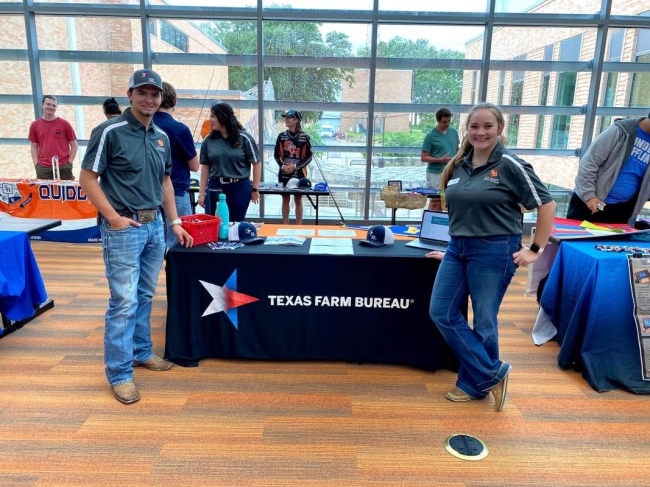You have /5 articles left.
Sign up for a free account or log in.

Sam Houston State University
Kaysi LaPoint visited the farm owned by her extended family in Lamar, Colo., as a child. They grew wheat and milo and raised cattle, and she loved “every minute of time spent out in the land” and learned the ins and outs of farming along the way.
“That sincere love and joy of being involved in agriculture has never left me,” she said via email.
LaPoint, a junior at West Texas A&M University studying animal science and agriculture business and economics, now leads the first university chapter of the Texas Farm Bureau, a membership organization that advocates on behalf of famers in the state. Her group is a part of an ongoing pilot program called the Texas Collegiate Farm Bureau, a network of campus chapters dedicated to creating a community of students interested in agriculture, promoting agriculture education and deepening students’ knowledge about the industry.
The American Farm Bureau Federation, which represents farm bureaus across the country, has about 118 Collegiate Farm Bureau chapters across 35 states, but this is the first time the program has taken root in Texas, with two initial chapters. West Texas A&M, located in the Texas Panhandle, launched its chapter in fall 2020, and Sam Houston State University in Huntsville followed in spring 2021. Midwestern State University, Tarleton State University and Vernon College also are also planning to launch chapters, according to the Texas Farm Bureau.
Whit Weems, director of organization for the Texas Farm Bureau, said the organization launched the initiative because it wanted to do more targeted outreach and offer more support to college students interested in agriculture.
“We just wanted to continue to strengthen that relationship with that audience and be able to provide some opportunities for them to continue to develop their leadership skills, continue to expand on a lot of things that those students were already doing from an advocacy standpoint … and just create that network of students across the state where they could interact with each other and all have kind of a common ground or common mission,” he said.
The number of American farms has been on the decline for decades. The U.S. Department of Agriculture estimates there were 2.2 million farms in the United States in 2020, down 4,400 farms from the previous year. Almost 98 percent of American farms were family owned in 2019, and most of them were small. Nonfamily farms produce 12 percent of agricultural products, despite making up only 2 percent of American farms, and they dominate the beef industry and the production of “high-value crops” like fruits, vegetables and tree nuts, alongside large-scale family farms, according to the USDA. Meanwhile, only 2 percent of Americans work in the agriculture industry.
“Texas is very high in ag production,” said Nate Wolf, assistant professor of agriculture education and leadership at West Texas A&M and faculty adviser to the Collegiate Farm Bureau chapter on campus. “As many of our older producers in farms and ranches are retiring, the younger generation, or their children, are no longer going back to the farm. They’re finding other jobs elsewhere -- they’re finding other employment, other businesses, other homes … The vision is to see more young farmers and ranchers get into production agriculture so we can help feed the nation.”
David Townsend, assistant director of member engagement at the American Farm Bureau Federation, pointed out that the average age of an American farmer is about 57 years old, according to the 2017 Census of Agriculture. He said one of the goals of the program is to “bring youth and life” to the farms and ranches in communities where students live, in addition to giving students the opportunity to network with more seasoned farmers.
“The decline in the number of farmers and ranchers in America points to a need for more people to get involved” in the agriculture industry, he said.
As a part of the program, each chapter will engage in agriculture education and advocacy in their communities, with $750 in starting funds from the Texas Farm Bureau. Students participating in the campus chapters will also be able to attend the annual American Farm Bureau Convention and the Texas Young Farmer & Rancher Conference held every spring, where they have a “collegiate discussion meet,” a debate competition on American agriculture.
The program “really gives them an opportunity to have a local presence where they can elect officers at the local level. They can start developing kind of an agenda and a mission of what they want to accomplish locally to do things within their school,” Weems said.
LaPoint hopes to set up booths around campus and the wider community and hand out fliers with facts about agriculture. Jerin Milam, president of the Sam Houston State chapter, said she wants to arrange trips to local farms and ranches and visit elementary schools to teach students about agriculture.
Milam, who is majoring in agriculture communications, believes young people have “an extreme lack of education” about agriculture. Her mother taught high school agriculture classes when she was growing up, and she remembers hearing that some students thought eggs came from cows because they were in the same aisle as the milk at the grocery store.
“There is a lack of interest in it because they don’t have to worry about where their food comes from,” she said. “They know that if they go home it’ll be in the pantry or in their fridge.”
LaPoint agreed that many of her peers are “ignorant” about the industry.
“It seems with every new generation, the connection to agriculture weakens,” she said. “If one talks to their grandparents or great-grandparents, it seems everyone had a farmer or rancher as a close relative. Yet, as time passes, we are further and further removed from the generations where every person was closely tied to [agriculture]. As a result, people truly do not understand the extent of agriculture, all it provides, and the steps to get there.”
She believes the Texas Collegiate Farm Bureau can help change that narrative.
“I hope that students gain additional knowledge about agriculture, learn about challenges facing ag, how to combat and overcome these challenges, and effectively and professionally take action,” she said. “I think there are a lot of people within my age group who could be involved in agriculture, but they are not.”









